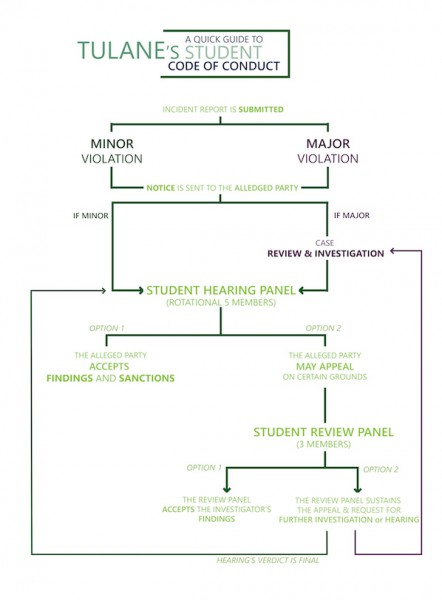Student code of conduct undergoes revisions, shifts focus

Anh Nguyen | Staff Artist
The new student code of conduct for the 2017-18 year features changes aimed at shifting focus from punishment to education.
Significant changes in the revised student code of conduct include the general tone of the document, the role of investigators and the standards for graduate and professional students. The new code also introduces educational conferences and a student hearing panel. Expunction of past records will no longer occur.
The new code focuses on development and educational opportunities for students. The tone of the 2016-17 code, which has been called punitive, is replaced by an emphasis on “immersive educational opportunities” for students.
Stating in its preamble that “we are not a court system nor will we behave like one,” the new code aims to make the disciplinary process less legally-oriented and more of a learning opportunity for students.
“We used to always tell students this isn’t a legal process, but then if you read our code it was written by lawyers and so it seemed like a legalistic process,” Erica Woodley, assistant vice president of Student Resources and Support Services, said. “So it was hard to get that message — it seemed like sort of a double message.”
Former Tulane student Austin Strait went through the old disciplinary process in fall of 2016 and said he felt it was misleading to say the system did not mimic a legal process.
“[Students should] treat it almost as a criminal proceeding more than anything else,” Strait said.
To coincide with the new code of conduct’s focus on development and education, students may now participate in educational conferences determined on a case by case basis when accused of minor charges. Director of Student Conduct Vanessa Rodriguez notes these will be offered primarily on first offenses and unlikely to occur more than once per academic year.
The idea behind the conference is to encourage students to reflect on the decision-making processes influencing their choices and work to prevent repeated patterns of the behavior.
“We want to have a conversation so you can learn from this and that’ll be it,” Brian Johnson, assistant vice president of Housing and Residence Life and Campus Recreation, said. “That you’ll focus on being a good person, focusing on your grades and being involved at Tulane the way we want you to be.”
In addition to the educational conferences, students may be asked to undergo a “learning action plan” to emphasize what was discussed in the conferences. If students adhere to the expectations of the conferences and plan in a timely and complete manner, there will be no effect on their permanent conduct record.
“Concern about a record being not pristine or something was really getting in the way of having just an open developmentally, educationally focused conversation,” Rodriguez said.
Following feedback from students like Strait, the new code shifts the role of investigators in the disciplinary process.
Previously, investigators would look into the claim and present their findings to the board. Student complainants and respondents will now work with the investigators throughout the process.
Investigators will work with the Title IX coordinator and the director of Student Conduct. Tulane’s current investigators are Dawn Broussard, assistant director of Student Conduct, and newly-hired Lex Kelch-Brickner. Two contracted investigators will also be trained and made available.
Student involvement, however, will not be eliminated entirely. The new code introduces a five-person hearing panel of students who are nominated, interviewed and trained. The panel will hear minor matters in which student organizations are charged.
Another major change to the code is the elimination of expunction requests. Under the new code, most minor matters will not be reported on students’ records at all, which is designed to alleviate the need for most expunction requests.
Overall, the changes to the code center on a philosophical shift in the administration toward educating rather than punishing students.
“It’s designed to help students become good humans, good citizens,” Woodley said. “… The whole reason we have a code of conduct is to create the kind of community that we want to have — to enforce the kind of standards of our community.”
Your donation will support the student journalists of Tulane University. Your contribution will allow us to purchase equipment and cover our annual website hosting costs.



ed • Dec 6, 2017 at 10:52 pm
Link below says everything about OSA
https://www.thecollegefix.com/post/38849/